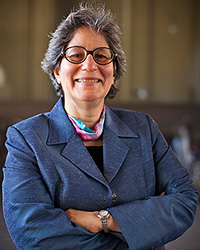Susan Solomon, Ph.D.
 Lee and Geraldine Martin Professor of Environmental Studies
Lee and Geraldine Martin Professor of Environmental Studies
Massachusetts Institute of Technology
Susan Solomon received her Ph.D. in chemistry from the University of California, Berkeley, in 1981. The following year, she became a scientist at the National Oceanic and Atmospheric Administration (NOAA) and an adjunct professor at the University of Colorado, Boulder. In 2012, Dr. Solomon moved to the Massachusetts Institute of Technology, in Cambridge, where she is the Lee and Geraldine Martin Professor of Environmental Studies.
Dr. Solomon is best known for her pioneering work in atmospheric chemistry, particularly explaining the cause of the hole in the Antarctic ozone layer. She is also recognized for influential studies in climate science, including the first work identifying how the ozone hole influences Southern Hemisphere climate.
Dr. Solomon received the 1999 U.S. National Medal of Science, the nation’s highest scientific award. She is also the recipient of the Grande Medaille of the French Academy of Sciences, the Blue Planet Prize in Japan, the BBVA Frontiers of Knowledge Award, and the Volvo Environment Prize.
Dr. Solomon served as co-chair for the Intergovernmental Panel on Climate Change (IPCC) fourth climate science assessment report, which was released in 2007. The following year, TIME magazine named her one of the 100 most influential people in the world.
Two geographic features in Antarctica have been named after her—Solomon Saddle and Solomon Glacier.